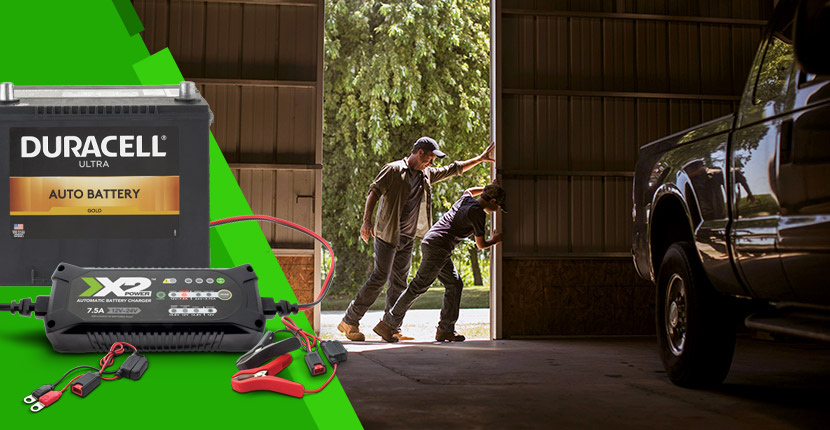How Do You Keep a Car Battery from Dying When Not in Use?
- by Bryan Veldboom - updated on 8/26/2021

If you're one of the many people currently working from home, you're probably doing a lot less driving. While that might be doing wonders for your gas budget, it turns out it's not so good for your car battery. Learn what happens when your car battery sits for too long and what you can do to help protect it.
How Long Can a Car Battery Sit Unused?
Every time you start your car, your battery expends an enormous amount of energy in order to start the engine. This energy is then replaced by the alternator, which recharges the battery while the vehicle is being driven. That's why regular driving is so important. An idle battery can go from fully charged to completely dead in a little under two months.
Experts recommend driving your vehicle for at least 30 minutes a week, preferably at highway speeds. Why 30 minutes? Short trips in which you're constantly stopping and restarting the engine don't provide the time necessary to fully recharge your battery. Driving for a longer period gives your alternator the opportunity it needs to do its job properly.
What Can Drain a Car Battery When the Car is Off?
If you're not driving your vehicle, then you're not using up its charge turning over the engine; so, how does the battery get drained? Modern cars have a lot of electronics in them, which are maintained and backed up by your vehicle's battery. As your car sits, the battery is still powering everything from alarm systems to your car's onboard computer systems. This is called parasitic drain. If you let your car sit long enough, this parasitic drain will use up the battery's entire store of power, leaving you with nothing to turn over your engine.
How to Keep a Car Battery Charged When Not in Use
The best way to protect your battery is by driving your vehicle regularly. If that's not an option though, there are a number of other things you can do to keep it charged.
1. Disable Parasitic Drains
If you're planning on parking in your garage, you can disable your vehicle's security system. Also, be sure that all the lights are turned off and that the trunk, glove box and doors are completely closed and latched.
2. Use a Battery Maintainer
Battery maintainers are a type of automatic charger designed to shut off once the battery has reached its full charge and resume charging once the power level dips below the optimal amount. This helps prevent both under and overcharging. When selecting a charger, be sure that the model you pick matches both the chemistry and voltage of your vehicle battery.
3. Disconnect the Negative Battery Cable
Disabling the negative battery cable will help prevent battery drain. Keep in mind though, that you'll likely lose your radio presets, clock settings and other memory functions. Also, be sure to remove any jewelry and wear protective gloves and eyewear when attempting to disconnect the cable.
The process itself is fairly simple. On the top of the battery, locate the connector that has a black cap or minus sign near it (the positive terminal will feature a red cap or a plus sign). Use a socket wrench to loosen the negative connector by turning counterclockwise. Once it's loose, disconnect the negative connector by pulling it off. Then, set the connector in a safe place away from the battery.
4. Remove the Battery Entirely
If you plan on storing a vehicle for an entire season, you may just want to remove the battery entirely. Be sure to store your battery in a dry, well-ventilated area with a steady temperature between 40 and 60 degrees F. You also might want to pick up a battery box to protect it from dirt, moisture and sunlight.
Another thing to keep in mind is that even though your battery is disconnected, it will still drain naturally (although much slower) and you will need to charge it. Check your battery's charge using a voltmeter every two to three months and recharge it any time it's at 70% charge or less.
What Do You Do if Your Car Battery is Dying?
No matter how well you maintain your battery, sooner or later, it's going to have to be replaced. If you notice that your battery frequently dies or that it takes you multiple attempts to start your vehicle, it's a good idea to have your battery checked. Batteries Plus offers free battery testing, so stop in for some valuable peace of mind. If you need a replacement, we also offer expert installation on most vehicles at most of our locations. You can even schedule your arrival time online.
Find your nearest store online or learn more about this topic from our blog. Related topics include "Why Won't My Car Start? Is the Battery, Starter or Alternator at Fault?" and "6 Things That Can Drain Your Car Battery."